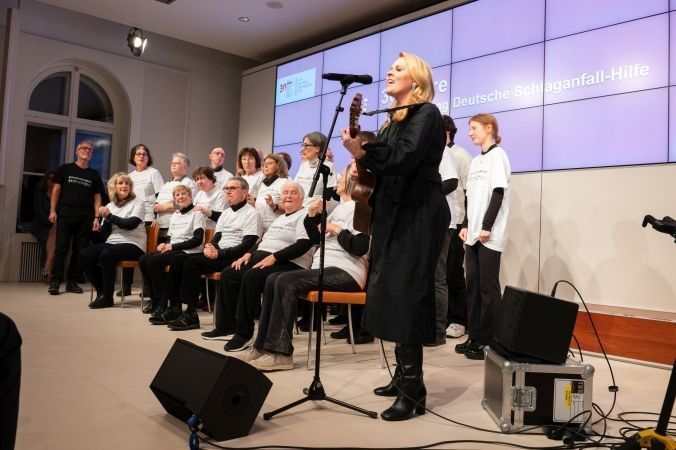Founded on 13.09.2011 by the Aphasie LV Berlin eV (ALB)
und der
Charité - Berliner Bildungscampus für Gesundheitsberufe
Die Musik gehört zum Leben; schon Adam und Eva haben gesungen.
(Paul Schibler, Schweizer Aphoristiker)
Chortermine für das Jahr 2025
Meret Terhorst-Kaiser: 030 450 555 114
meret.terhorst-kaiser@bildungscampus-berlin.de (Available Tuesday to Friday)
Location: Oudenarder Straße 16, Building A, 1st floor, entrance 1013347 BerlinInformation also from:Christel Rühle, phone 030-661 74 41ruehle@aphasiker-berlin.deAndré Laqua, mobile 0160 96 46 46 62laqua@aphasiker-berlin.deNew singers are always welcome!


Singen trotz Aphasie
And then it came to a particularly emotional finale: Singer Patricia Kelly performed for the first time with the Aphasia Choir Berlin. The women and men of the choir have lost some of their speech due to their stroke, but singing helps them relearn it – pure goosebumps in the hall during "Amazing Grace" and tears of joy from some of the singers.
https://www.schlaganfall-hilfe.de/de/aktuelles/2023/stiftung-feiert-emotionales-jubilaeum
Singing improves speech after a stroke
WOU | 04.01.2023
Singing as a rehabilitation measure after a stroke can promote speech function and well-being. In a group setting, this is a cost-effective treatment option that also offers the opportunity for peer support.
In a Finnish study, singing significantly improved everyday communication and speech function after five and nine months compared to standard rehabilitation. Patients' social participation was increased, and the burden on caregivers was reduced.
Stroke patients suffering from severe speech impairments often retain the ability to sing. The research team from the University of Helsinki therefore incorporated group and individual singing, as well as tablet-supported vocal training, into the rehabilitation program. The patients were supervised by a music therapist and a choir director. In addition to singing in the choir, individual melodic intonation therapy was also provided, using melody and rhythm to gradually progress from singing to speech production.
“In addition to speech production training, group-based rehabilitation provides an excellent opportunity for mutual support for both patients and their families,” said Sini-Tuuli Siponkoski, lead author of the study, which was published in the journal Brain Communications.
Approximately 40 percent of stroke survivors experience difficulty speaking or understanding language. For half of these individuals, the speech impairment persists for a year or more after the stroke. This severely impacts their quality of life and often leads to social isolation.
Quelle: DOI 10.1093/braincomms/fcac337
The Aphasiker Chor Berlin (ACB) meets every two weeks. It brings together people who have lost their speech—but not their singing.














